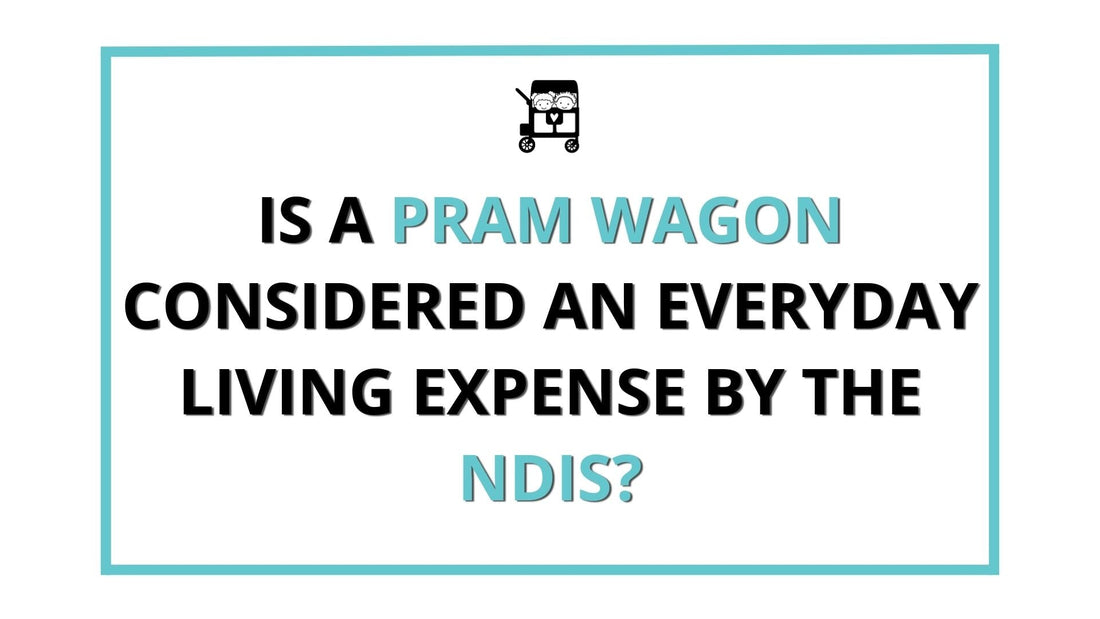
Is a Pram Wagon considered an everyday living expense by the NDIS
Share
In the context of the National Disability Insurance Scheme (NDIS), it's important to understand that the NDIS aims to fund supports that are considered reasonable and necessary for an individual with a disability to live an ordinary life and participate in the community. While the NDIS covers a broad range of supports and services, including assistive technology, modifications, and daily living expenses, the funding decisions are based on whether an item or service meets the criteria of being reasonable and necessary for the individual's needs.

A Pram Wagon may be considered a specific assistive device or equipment designed to address the needs of a child with a disability. However, whether the NDIS would fund a Pram Wagon as an everyday living expense depends on several factors:
1. Reasonable and Necessary
Any purchase made with your NDIS funds must pass the reasonable and necessary test.
Reasonable is something that is fair and necessary is something you need because of disability.
To be considered reasonable and necessary, a support must:
· Be related to your disability needs
o A pram wagon may meet the reasonable and necessary criteria by providing a safe, secure, and supported way for a child with a disability to participate in daily activities and community outings, addressing their mobility, sensory, or behavioural needs in a way that standard prams or mobility devices may not
· Help you pursue your goals
o A pram wagon may help a child pursue their goals—such as increasing social and community inclusion—by providing a safe and supportive way to attend events, visit parks, and participate in outings with family and peers, even when mobility or behavioural challenges might otherwise make this difficult.
· Help improve economic and community participation
o A pram wagon may help improve economic and community participation by enabling families to safely and confidently take their child with a disability to work, appointments, shopping centres, or community events—supporting both the child’s engagement and the carer’s ability to maintain employment or attend essential activities
· Be value for money
o A pram wagon represents value for money by combining the functions of a pram, mobility aid, and sensory-safe space in one durable product—reducing the need for multiple supports and enabling long-term use as the child grows.
· Be effective and beneficial
o A pram wagon is both effective and beneficial, as it provides a practical solution for transporting a child with a disability in a way that supports their safety, regulation, and inclusion—making it easier for families to engage in regular routines and community life.
· Take into account what is reasonably expected for families and communities to provide
o A pram wagon takes into account what is reasonably expected of families and communities by offering additional support beyond typical parenting needs—addressing complex mobility, behavioural, or sensory challenges that go beyond what a standard pram can manage.
· Be an NDIS support for the participant
o A pram wagon MAY qualifY as an NDIS support for the participant by directly addressing their functional limitations and enabling greater access to everyday activities, aligning with their individual goals and disability-related support needs."
2. Functional Impact
The NDIS considers the functional impact of the disability on the individual's ability to perform daily activities. If the child has mobility challenges that significantly affect their ability to move independently, a Pram Wagon may be considered a necessary support.
3. Alternative Supports
The NDIS will assess whether there are alternative, more cost-effective supports available that could meet the child's needs. If there are other mobility aids or equipment that can fulfill a similar purpose, the NDIS may consider those options.
4. Individualised Assessment
Funding decisions are made on an individualised basis, taking into account the specific needs and goals of the child. A paediatric occupational therapist would play a key role in assessing the child's requirements and advocating for necessary supports.
5. Impact on Independence
The NDIS considers whether the support will enhance the participant's independence and ability to participate in community activities. If a Pram Wagon significantly contributes to the child's independence and inclusion, it may be considered.

Request a NDIS invoice from PRAGON here.
It's crucial for families and healthcare professionals to work collaboratively with the NDIS and provide clear evidence of how a Pram Wagon is directly related to the child's disability and contributes to their overall well-being. This may involve submitting assessments, reports, and other documentation that highlight the functional impact and necessity of the Pram Wagon in the child's life.
Ultimately, whether a Pram Wagon is funded as part of the NDIS plan will depend on the specific circumstances and the thorough assessment of the child's needs by healthcare professionals involved in the NDIS planning process.
Please contact your Support Team or Local Area Coordinator (LAC) for more information.
Update: As the NDIA continues to strengthen their position on payment integrity, there have been changes made to the claims review and payments process. The NDIA will NO LONGER release funding overnight. Funds should now be released from the NDIA within 3 business days after the claim is made. Consequently, payments to providers may take up to 5 business days.
